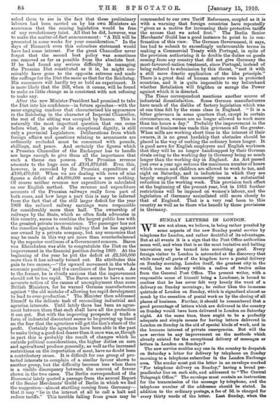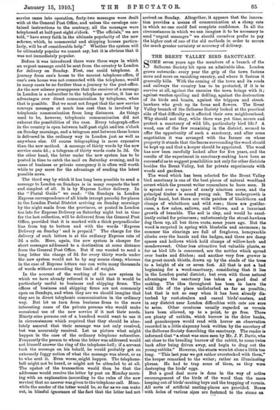SUNDAY LETTERS IN LONDON.
WE are not alone, we believe, in being rather puzzled by some aspects of the new Sunday postal service by telephone for London, and rather doubtful of its advantages. But at all events it is a sign that the Post Office authorities mean well, and when that is so the most tentative and halting innovation may be turned into something good. Every foreign visitor to London is astounded at the discovery that while nearly all parts of the kingdom have a postal delivery on Sunday morning, London itself, the greatest city in the world, has no delivery within a radius of twelve miles from the General Post Office. The present writer, with a responsible sense of himself being a Londoner, is bound to confess that he has never felt very keenly the want of a delivery on Sunday mornings; he rather likes the immense quietude of London on Sunday, which is signalised almost as much by the cessation of postal work as by the closing of all places of business. Further, it should be remembered that a good percentage of letters which are delivered in the country on Sunday would have been delivered in London on Saturday night. At the same time, there ought to be a perfectly adequate and simple means for having letters delivered in London on Sunday in the aid of special kinds of work, and in the humane interest of private emergencies. But will the new service be any improvement on the methods which already existed for the exceptional delivery of messages or letters in London on Sundays P The new service enables any one in the country to despatch on Saturday a letter for delivery by telephone on Sunday morning to a telephone subscriber in the London Exchange area The sender must put the letter in an envelope marked "For telephone delivery on Sunday," having a broad per- pendicular line on each side, and addressed to "The Central Telegraph Office." The envelope must contain an instruction for the transmission of the message by telephone, and the telephone number of the addressee should be stated. In addition to the ordinary postage, a. fee of 3d. is charged for every thirty words of the letter. Last Sunday, when the
service came into operation, forty-two messages were dealt with at the General Post Office, and unless the envelope con- tained instructions to the contrary, all the messages were telephoned at half-past eight o'clock. " The officials," we are told, " have every faith in the ultimate popularity of the new scheme, which, to commercial and shipping houses particu- larly, will be of considerable help." Whether the system will be ultimately popular we cannot say, but it is obvious that it was not immediately popular.
Before it was introduced there were three ways in which an urgent message could be sent from the country to London for delivery on Sunday. First, one could telephone. A journey from one's house to the nearest telephone-office, if one's own house was not connected with the telephone, would in many cases be no further than a journey to the post-office.
As the new scheme presupposes that the receiver of a message in London is a subscriber to the telephone service, it has no advantages over direct communication by telephone, when that is possible. But we must not forget that the new service conveys messages at much less cost than is involved by telephonic communication from long distances. As things used to be, however, telephonic communication did not exhaust the possibilities of the case. Every telegraph-office in the country is open between half-past eight and ten o'clock on Sunday mornings, and a telegram sent between those hours is delivered in the ordinary way in London just as well as anywhere else. Of course telegraphing is more expensive than the new method. 'A message of thirty words by the new service costs 4d.; a telegram of thirty words costs ls. 3d. On the other hand, the letter under the new system has to be posted in time to catch the mail on Saturday evening, and in cases of business or private emergency it is often well worth while to pay more for the advantage of sending the latest possible news.
The third way by which it has long been possible to send a message to London on Sundays is in many respects the best and simplest of all. It is by Express Letter delivery. In the " Postal Guide" we read : " On Sundays in London Express correspondence of all kinds (except parcels) for places in the London Postal District arriving on Sunday mornings by the night mails from the provinces, or posted in London too late for Express Delivery on Saturday night but in time for the last collection, will be delivered from the General Post Office, provided that it is marked with a thick perpendicular line from top to bottom and with the words 'Express Delivery on Sunday' and is prepaid." The charge for the delivery of such letters is at the ordinary Express rate of 3d. a mile. Here, again, the new system is cheaper for short messages addressed to a destination at some distance from the General Post Office. But if one wanted to send a long letter the charge of 3d. for every thirty words under the new system would not be by any means cheap, whereas in the case of Express letters one can write many thousands of words without exceeding the limit of weight.
In the account of the working of the new system to which we have already referred it is said that it would be particularly useful to business and shipping firms. The offices of business and shipping firms are not commonly open on Sundays, and when they are we should imagine that they are in direct telephonic communication in the ordinary way. But let us turn from business firms to the more interesting cases of the private persons who would make occasional use of the new service if it met their needs. Ninety-nine persons out of a hundred would want to use it in circumstances which required that they should be abso- lutely assured that their message was not only received, but was accurately received. Let us picture what might happen in the case of the ordinary telephone subscriber. Frequently the person to whom the letter was addressed would not himself answer the ring of the telephone-bell ; if a servant took the message on his behalf, he would probably get an extremely foggy notion of what the message was about, or as to who sent it. Even worse might happen. The telephone- bell might not be beard, or might not be attended to at all. The upshot of the transaction would then be that the addressee would receive the letter by post on Monday morn- ing with an explanation (according to the rules of the new service) that no answer was given to the telephone call. Mean- while the sender of the letter would be, so far as we can make out, in blissful ignorance of the fact that the letter had not arrived on Sunday. Altogether, it appears that the innova- tion provides a means of communication at a cheap rate in which no one could feel complete confidence. In all the circumstances in which we can imagine it to be necessary to send "urgent messages" we should ourselves prefer to pay the higher cost of one of the old methods in order to secure the much greater certainty or accuracy of delivery.







































 Previous page
Previous page